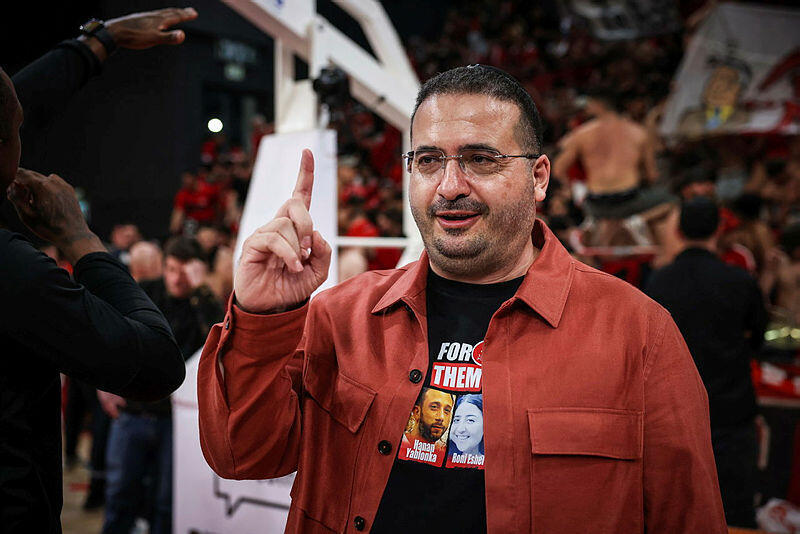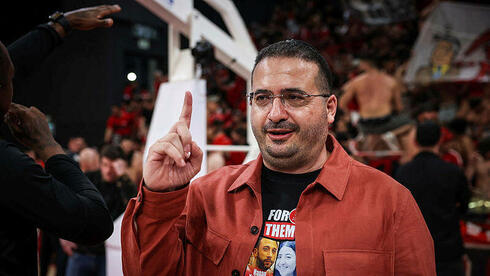Ofer Yannay, the controlling owner of the Hapoel Tel Aviv basketball club, is attempting to recruit new investors for the team through a crowdfunding campaign that began earlier this month on the PipelBiz website, a platform for investing in private companies that are exempt from publishing a prospectus as long as funds are not raised from more than 35 investors.
According to the campaign, the minimum investment amount is NIS 100,000 (approximately $31,000). Calcalist has learned that Yannay’s goal is to raise about NIS 20 million ($6.2M) through the initiative, based on a pre-money valuation of NIS 180 million ($55M) and a post-money valuation of NIS 200 million ($62M). In other words, the new investors would receive shares amounting to roughly 10% of the club. The fundraising effort comes amid the team’s growing need for liquidity, given its ongoing losses, even after venture capitalists Gili Raanan and Micky Malka injected NIS 38 million ($11.8M) into the club this year alone, alongside other inflows and commitments. Yannay’s current operating budget stands at almost NIS 65 million ($20M). Calcalist has also learned that the club ended 2024 with a loss of NIS 40 million ($12.4M).
1 View gallery


Ofer Yannay.
(Photo: Oz Mualem)
Today, Yannay, who also serves as the controlling shareholder of the publicly traded Nofar Energy, holds 56% of the club’s shares. Raanan owns 10%, Malka holds 15%, and the Ussishkin Association controls 19%. The club’s CEO is Tzhaki Reichenstein.
According to information provided by Hapoel Tel Aviv to potential investors, this crowdfunding campaign is intended as a preliminary step toward an IPO, a move that, if completed, would make Hapoel Tel Aviv the only publicly traded Israeli basketball team. However, a review of past examples suggests that going public has rarely been a lucrative “exit” for sports clubs.
A March report titled Sports Teams IPOs and Stock Performance, published by the data firm Multyples, analyzed the trading performance of over 30 publicly listed sports teams, most of them European, and found that the majority had significantly underperformed since going public. Some, such as Italian football club Juventus, now worth around $1 billion, saw their stock value drop by as much as 70%. Shares of German team Borussia Dortmund, valued at $360 million, have gained 54% since its IPO but fallen 30% over the past five years. French club Lyon, worth $280 million, plunged 90% since its listing.
One notable exception is Manchester United, which has maintained relative stability and is valued today at $2.7 billion. Two American franchises also stand out: MSG Sports (which owns the New York Knicks and New York Rangers), worth $5.2 billion after an 84% rise over the last decade, and the Atlanta Braves, valued at $2.5 billion, which went public in July 2023 and has maintained a steady market value since.
Hapoel Tel Aviv, a five-time Israeli basketball champion and four-time cup holder, has an impressive record, but it remains overshadowed by its city rival, Maccabi Tel Aviv, which has won 57 championships and 45 cups. The disparity between the two clubs is reflected not only in achievements but also in valuations. Maccabi Tel Aviv is currently seeking new investors at a valuation of $150 million, roughly 2.5 times higher than the valuation attached to Hapoel Tel Aviv in the crowdfunding campaign.
Maccabi Tel Aviv’s ownership structure includes the Federman family (29%), the Recanati family (29%), Richard Deitz (17.5%), Shimon Mizrahi (14.5%), and Ben Ashkenazy (10%). The Federman and Recanati families jointly control the club, while Deitz, Mizrahi, and Ashkenazy are additional shareholders.
The main difference between the two Tel Aviv rivals, beyond their domestic records, lies in Maccabi’s Euroleague license, which guarantees participation in the premier European basketball competition regardless of its standing in the Israeli league. This means that while Hapoel Tel Aviv currently sits near the top of the Euroleague standings, ranked third with seven wins out of nine games, its participation next season is not assured. To return to the Euroleague, Hapoel must either win the competition or secure the Israeli championship. Maccabi, in contrast, sits near the bottom of the Euroleague table, ranked 19th out of 20, yet its spot for the 2026/27 season is guaranteed. The Euroleague license, granted to Maccabi as one of the tournament’s founding clubs, also entitles it to a share of the league’s revenues.
In 2027, however, a significant new rival to the Euroleague is expected to emerge: the NBA European league, which will feature leading European basketball clubs. NBA Commissioner Adam Silver recently stated that the league views Europe as a major, underutilized market that lacks a unified platform combining sports, entertainment, and audience engagement. European teams joining the NBA European league would gain the prestige of the NBA brand and opportunities to face American teams.
For Hapoel Tel Aviv, this could present a new opportunity, provided it maintains strong performance on court in the coming seasons. Success on the court could place the club on the radar of the NBA’s European expansion and mark a new era in its growth trajectory.
